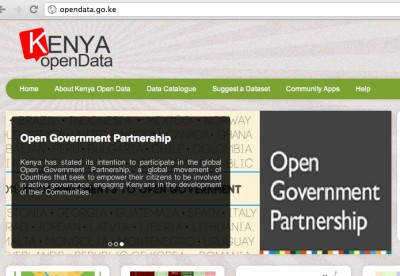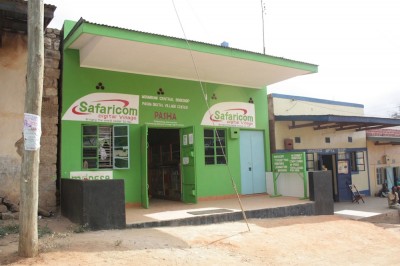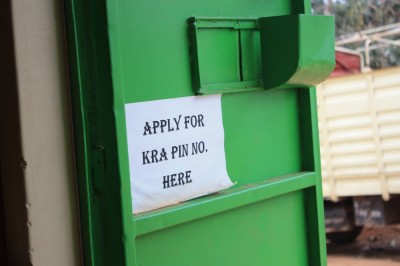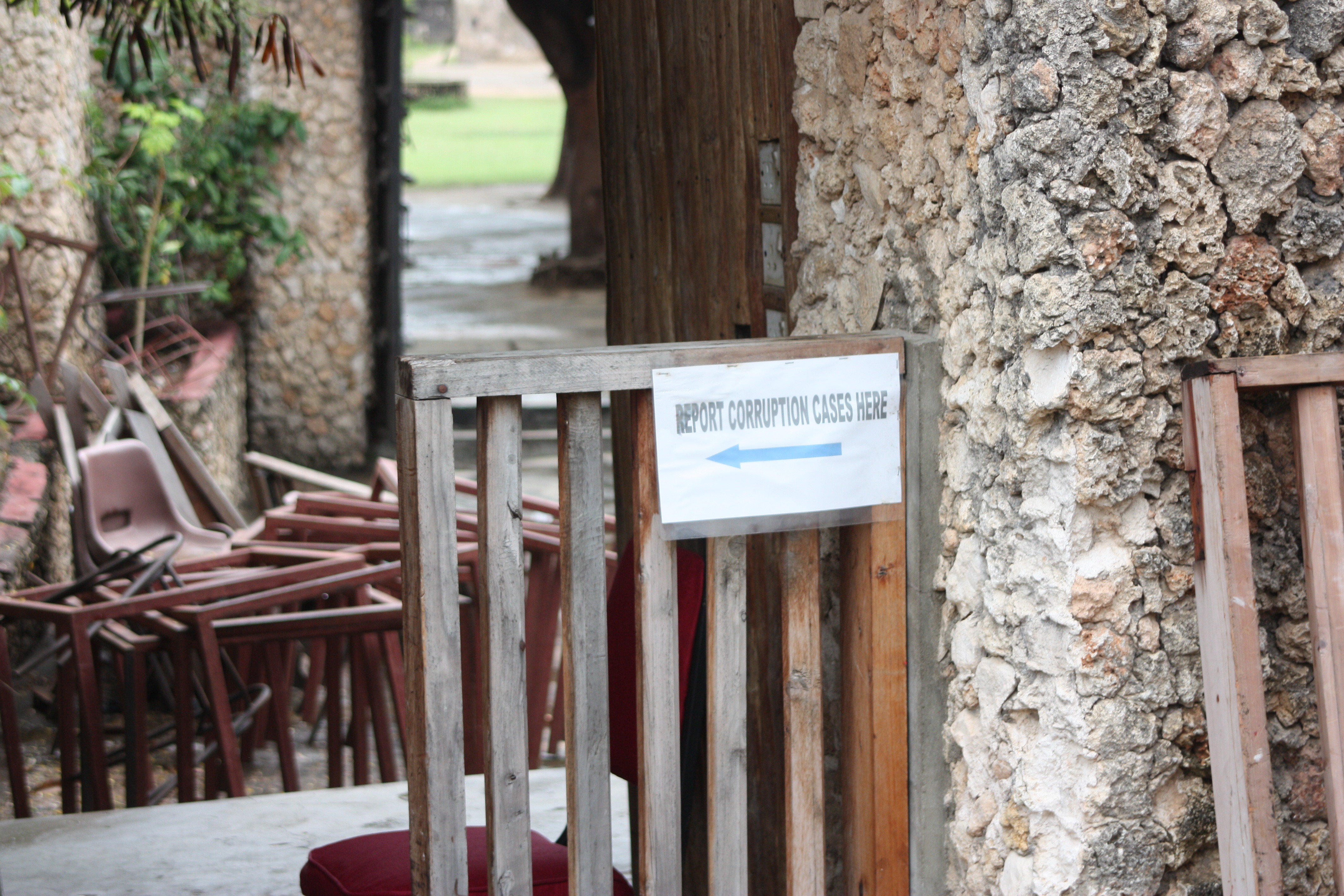Archive for the ‘Africa’ tag
Bringing Social Objects to Citizen Empowerment
Sparking conversations among citizens is the first step to creating change.
Kenyans woke up to a pleasant surprise one March morning. Graffiti with a political message sprayed on walls in Nairobi’s central business district. And not the terrible kind that is an eye-sore with good intentions. This was “stop-and-stare” graffiti that not only made news in Kenya but overseas as well.
Tweet
Corporate Big Data Should Team Up With Public Open Data
In the early days of the Obama administration, the idea of open data was transitioned from lofty ideal to a reality pushing huge amounts of government-held data onto public portals. What started in the US, however, became a global process. Many governments have since committed themselves to provide data to their citizens through similar portals and to abide by the principles of open government.
This coming June, Kenya will celebrate one year of open data and a portal that has grown to over 220 datasets and a total of 500 data elements (datasets, documents, charts etc). A number of interesting mobile and web apps have been created that utilize the data such as MedAfrica. Although there have been signs of some cool apps, the number of apps I expected one year on haven’t quite materialized. However, 12 months is a short time and the next couple of years could very well see the rise of novel applications and highly innovative ways of communicating public data to citizens or using it to add value to commercial apps.
Now that the government is publishing data online and will continue to do so as legislation is enacted to further reinforce this, what’s next? I say MORE DATA. Not just government data. It’s time for corporate big data to join the party. The private sector has a wealth of data gathered everyday from citizens around the country. The level of intelligence contained in corporate data is so vast, fresh and detailed I’m certain the staff at the national bureau of statistics salivate at the thought of getting their hands on it. So do local small businesses and start-ups. Although the data held by a single corporate entity on its customers may be detailed and extremely valuable, it becomes even more valuable when taken together with data from other corporate entities. Taken together with public open data, this data is priceless.
Corporate open data could have immense impact on consumer/citizen facing organizations in both for-profit and non-profit sectors. Here are some possibilities that come to mind
- Banking data e.g. insights into average deposit size by county, number of business accounts, penetration of banking services by geographic location and population (percentage of population with bank accounts).
- Consumer goods sales e.g data on consumption of goods by location, trends, average price of most popular product type.
- Telecommunications e.g. Airtime sales by location, average size of airtime purchase, average call length by location, average number of text messages per person by location, number of subscribers accessing the internet via mobile or via other devices etc
- Disease prevalence e.g. data from private healthcare facilities could provide additional information on number of cases diagnosed by disease, location and trends beyond the diseases that are most commonly observed at public facilities.
In an age where information is king, helping communities empower themselves and turn their fortunes around requires access to the right information. Information that allows them to understand why their counties attract low investment, or whether they have the infrastructure to leverage for economic development, or what their political leaders can do to improve their quality of life. The answers to these and many other questions lie not just in government data but in corporate data as well.
Empowering citizens to become more active in their own governance is a key principle of open government and one which open data reinforces well. Empowered citizens make empowered customers and (I’m pretty certain) makes for good business somehow. It is possible that corporate social responsibility on this side of the industrial age may include providing data to the public that could help them change their world. Isn’t that a possibility East African businesses should consider investing in just as their governments are doing?
Government Services Intermediation: The New Role for Cybercafes.
Mbumbuni is a rural market town in Kenya’s Mbooni East District approximately 120km from Nairobi. Within the market is one of the Kenya ICT Board supported Pasha Centers and probably one of the best equiped cybercafes I have seen. When I visited the area in August of 2011, the 3G signal was poor and the center was using a GSM router connecting via EDGE to provide access to clients. The resulting experience was of course poor. For the residents in the area, the next cybercafe with a good connection is in Masii 8km away or in Wote town 50km away. For anyone wishing to register with the tax authority (a prerequisite to opening a bank account), a working cybercafe is the primary mode of accessing the authority’s online portal. There is no way of obtaining the registration at a KRA office. Cybercafes and Pasha centers charge an average of Ksh150 and as high as KSh250 to help clients complete the process and only a per minute charge for those savvy enough to login and do it themselves. For the residents of Mbumbuni, the Pasha center is their first option. Other options are guaranteed to be more expensive.
In the last four months I have travelled to parts of Kenya I only read about. Some of them almost 600 km away from Nairobi and others just an hours drive away. I have seen places where cybercafés are doing great and others where they are struggling to stay open. The landscape is varied but inspiring. Our estimates put the number of cybercafes in Kenya at approximately 2,500 most of them concentrated in the more densely populated parts of the country. Although statistics show a growing number of Internet users (35% of the population at last count), the vast number appear to be using their mobile phone as their primary gateway. Although feature phones can now provide 3G Internet access, play music and take pictures they still can’t print, scan or edit documents. With very low PC penetration in the country the rational decision is to therefore default to cybercafes for these tasks and others not yet available on mobile. Such as eGovernment.
The move by government departments and agencies such as the Kenya Revenue Authority to port services onto online spaces and then discontinue offline provision can be seen as a sign of progress. However, in using eGovernment to scale services fast across large areas at low cost, new barriers to access emerge. Digital barriers and cost barriers. These barriers have created new opportunities for cybercafé owners and Pasha center entrepreneurs allowing them to charge for a service that didn’t exist only a couple of years ago. The cyber café has now acquired a new role as an intermediary to government services introducing with it new costs of intermediation.
Whereas eGovernment presents a new opportunity for private enterprise in the form of new intermediation services, the government still needs to find ways of encouraging telcos to deploy better last mile connectivity (3G, LTE) to rural places where the financial investment may not achieve ROI in the short term. If poor connectivity remains a problem, the services may not be any closer to the people than they were before when the residents of Mbumbuni and Masii had to travel to Machakos, Wote or even Nairobi to get government services. In my opinion, there are three areas the Directorate of eGovernment and other actors in the space may consider giving priority as Kenya marches on into a fully digital future.
Better connectivity. Better 3G or LTE connectivity for the last mile to the cybercafes located in rural areas is a good place to start. Providing better connectivity could trigger consumption of data as people find utility for it. In places such as Maai Mahiu and Isinya we heard from a couple of people how frustrating spotty connections are. In Isinya, 40km from the city of Nairobi, residents opt to travel to Kajiado town or Kitengela rather than endure the local cybercafe’s unreliable connections.
Pricing Interventions / Guidelines. When intermediation services become high enough to become a bona fide barrier to access, there’s a problem. Ksh250 is enough to feed a family of four for a day or two. In areas where government services are only available online, this could mean that some families opt out of crucial government services they shouldn’t be having to do without. The initial premise is to bring services closer to the people. High financial costs neuter that objective. Introduction of price caps that keep it financially interesting for enterpreneurs to provide access to these services while remaining accessible to the majority of the people maybe an option worthy of some consideration.
Design for mGovernment. 24 million mobile devices are hard to ignore. Policy guidelines that allows government departments to design and deploy services on the mobile platform should be a priority in the short term. If bringing services closer to citizens is a priority, the mobile handset is as close as it can get.
As new formal intermediaries to government services begin to emerge with the rollout of new infrastructure and services, governments need to keep everyone in the ecosystem on the same page. Cybercafe owners need to remain motivated to provide the services, government departments need to create and train technical and customer care teams and citizens need to be educated on how to access and utilize these services.
From Open Data to Open Action
“The thing to remember is, Human beings do not socialize in a completely random way. There’s a tangible reason for us being together, that ties us together. Again, that reason is called the Social Object.” Hugh MacLeod
The Open Government Partnership declaration commits members to support civic participation in addition to making data on government activities open to the public. In Africa, Kenya made history as the first country in sub-Sahara Africa to implement an open data initiative giving citizens unprecedented access to valuable datasets. 40 countries, 5 of them African countries, have since signed up to the OGP and I believe they are at different levels of following through on the spirit of the declaration.
The value of open data to citizens is unquestionable. This year, Kenyan software developers have launched mobile apps that leverage open data to provide services to citizens. They have mostly been in the healthcare and agriculture verticals but services in education and entertainment have begun to emerge. These are very encouraging signals coming out of a country that only a decade or two ago made it almost impossible for citizens to know what the government was doing. These apps may not have been possible without access to the huge amount of data the government holds and is now making available to software developers.
However, we shouldn’t think of only mobile and the web when we talk about leveraging open data. “To turn raw data into ‘edible’ content that citizens can consume and make decisions with” should be the overarching objective for anyone looking to improve citizen participation in governance through open data. This edible bits of content should be easily consumed on the now ubiquitous mobile devices in Africa as well as on old fashioned news print and billboards. Jyri Engestrom refers to social networks as “object-centered sociality” meaning people connect because they have a reason to and that reason is usually an object (in the loose sense of the word). Moving from mere intentions to action may start with little more than an object (physical or otherwise).
Apps for Africa: 3 Reasons To Focus on Mobile
The iTunes App store has had phenomenal success as a content distribution platform starting with music and then moving into magazines, books and software applications. There are currently more than 300,000 apps on offer on the App store and numerous stories of developers who went on to make millions of dollars from publishing the apps to the store. The App store may have been solely responsible for spawning a whole new sub-sector for application development that wasn’t taken very seriously until then. Read the rest of this entry »
Tweet




